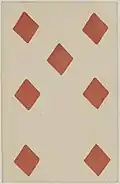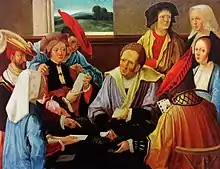Penneech
Penneech or Peneech, sometimes called Penicth,[1] is an unusual historical English card game for two players played with hands of seven cards. The unique feature of this game is that the trump suit changes with each trick.[2] Parlett describes it as a "jolly little two-hander".[3]
 The Penneech | |
| Origin | England |
|---|---|
| Type | plain-trick game |
| Players | 2 |
| Cards | 52 |
| Deck | English pattern, French-suited |
| Play | Alternate |
| Playing time | 12-15 min. |
| Unique feature: trumps change with each trick | |
History
Penneech was first described by Charles Cotton in the 1674 and first edition of The Compleat Gamester,[4] and repeated in all subsequent editions until 1754. There are no other descriptions of the game, although it is mentioned in passing by Holme in 1688[5] and described as "a game formerly in use" in 1822.[6] It is alluded to in Pepys Ballads, II, 98 (1625-1640).[1]
Cards
A standard 52-card pack of English pattern, French-suited cards is used with Aces ranking high.[3]
Play
The following is a description based on Cotton's rules, supplemented by Parlett:[4][3]
Players cut for the first deal, the lower card winning (Aces low for this purpose).[3] The dealer deals 7 cards each, individually, and turns the next for trumps,[4] placing the rest face down as the stock. A player with no Aces nor face cards may throw in his cards for a fresh deal.[4] Elder hand leads to the first trick.[3] Players must follow suit if able; otherwise may play any card.[3] The trick winner turns the next card of the stock for trumps[4] and leads to the next trick.[3]
Players score for cards won in tricks and for turning a counter as trumps. An Ace is worth 5 points, a King 4, a Queen 3 and a Knave 2. The ♦7, called Penneech, is the highest card when Diamonds are trumps and is worth 14 points when turned or 7 points in the hand.[4] If diamonds are not trumps it has no scoring value, but still ranks as the highest diamond. Players also score 1 point per card taken in excess of seven. Game is 61 points.[4]
Having tested the game extensively Parlett recommends using a cribbage board for scoring.[3]
References
- 1947 & Western Folklore, p. 151.
- Penneech at merriam-webster.com. Retrieved 7 November 2020.
- Penneech at parlettgames.uk. Retrieved 7 November 2020.
- Cotton 1674, pp. 148/149.
- Holme 1688.
- Nares 1822, p. 371.
Bibliography
- _ (1947). Western Folklore. Californian Folklore Society.
- 1674: The Compleat Gamester. A.M, London. Charles Cotton.
- Holme, Randle (1688). The Academy of Armory. Vol 2, ed Jeayes, Roxburgh Club, 1905. BM C.101.h.2.
- Nares, Robert (1822). A Glossary or Collection of Words, Phrases, Names and Allusions to Customs, Proverbs, etc. London: Triphook.
External links
- Parlett, David (2020). Penneech at parlettgames.uk. Description of history and rules.
- How to Play Penneech at catsatcards.com.
